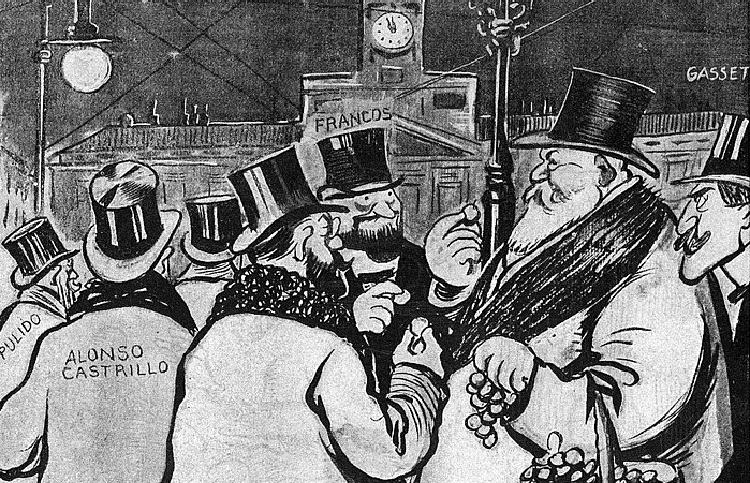Eduardo González
“It is customary in Madrid to eat twelve grapes when the clock strikes 12 at the turn of the year”. Thus the local press reported in January 1897 a practice which, although new by then, had already taken root enough to become one of the most characteristic traditions of New Year’s Eve.
When eating grapes tradition began in Spain? The versions abound. According to the newspapers of that time, in the nineteenth century the wealthy classes in Madrid had begun to imitate the habit of eating grapes and drinking champagne to receive the New Year. “The tradition has been brought from France, but has acquired among us a letter of nature”, said the newspaper El Imparcial in 1894.
On January 1, 1896, the newspaper La Correspondencia de España described how in the “beautiful residence of the president of the Council of Ministers”, General Martinez Campos, “the ministers greeted the arrival of the new year by eating rich grapes and drinking champagne”. In addition to singing “enthusiastic and patriotic toasts” to the army that “bravely fights in Cuba”. Given what was going to happen two years later in the island, the toast does not seem to be very propitiatory.
In any case, what began as a mere aristocratic custom and became customary at the end of the century among the Madrid bourgeoisie lived its own popular version in 1882 thanks to a side of the mayor of Madrid, José Abascal, which imposed the payment of a penny on anyone who participated, on the night of January 5, in the so-called “reception of the Three Kings” to end the usual riots and drunkenness.
To protest for this measure, which caused a deep popular unease, some few people from Madrid decided to organize a burlesque act in the Puerta del Sol, where Home Ministry headquarters were. They represented, in the cold of the night, a satire on what aristocrats did in the heat of their mansions: eating grapes to the rhythm of the bells chime.
The jest rooted and became a tradition that, in few years, spread to many other Spanish cities that knew how to find their own scenarios to eat the grapes. “There is a sick person who trusts grapes more than any medicine in the world”, lamented a newspaper of the time which wrote aobut “these superstitions that the devil inspires”.
The episode that most contributed to the spread of the custom came in 1909, when winemakers of Alicante and Murcia did not find a better way to give way to the surpluses of a particularly good crop than by financing a campaign throughout Spain in which they encouraged to eat one grape for each of the twelve bells to receive the year.
The habit of eating grapes in New Year’s Eve exists in other Spanish-speaking countries, such as Argentina, Chile, Colombia, Ecuador, Mexico, Peru or Venezuela. In Greece people eats a cake called Vassilopitta, inside which a coin is introduced, and in Italy is prepared a dish of stewed lentils, a Roman tradition propitiatory of fortune.






